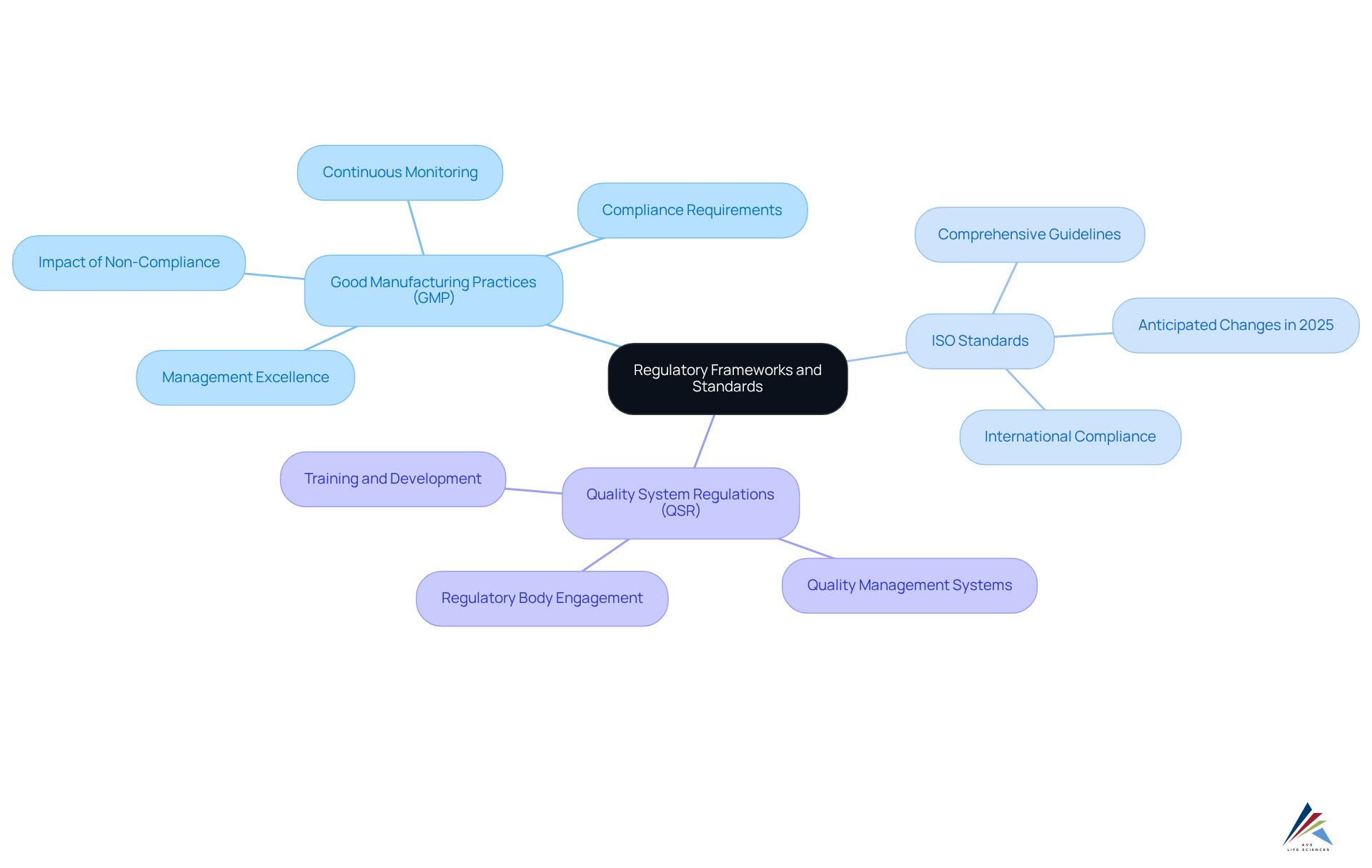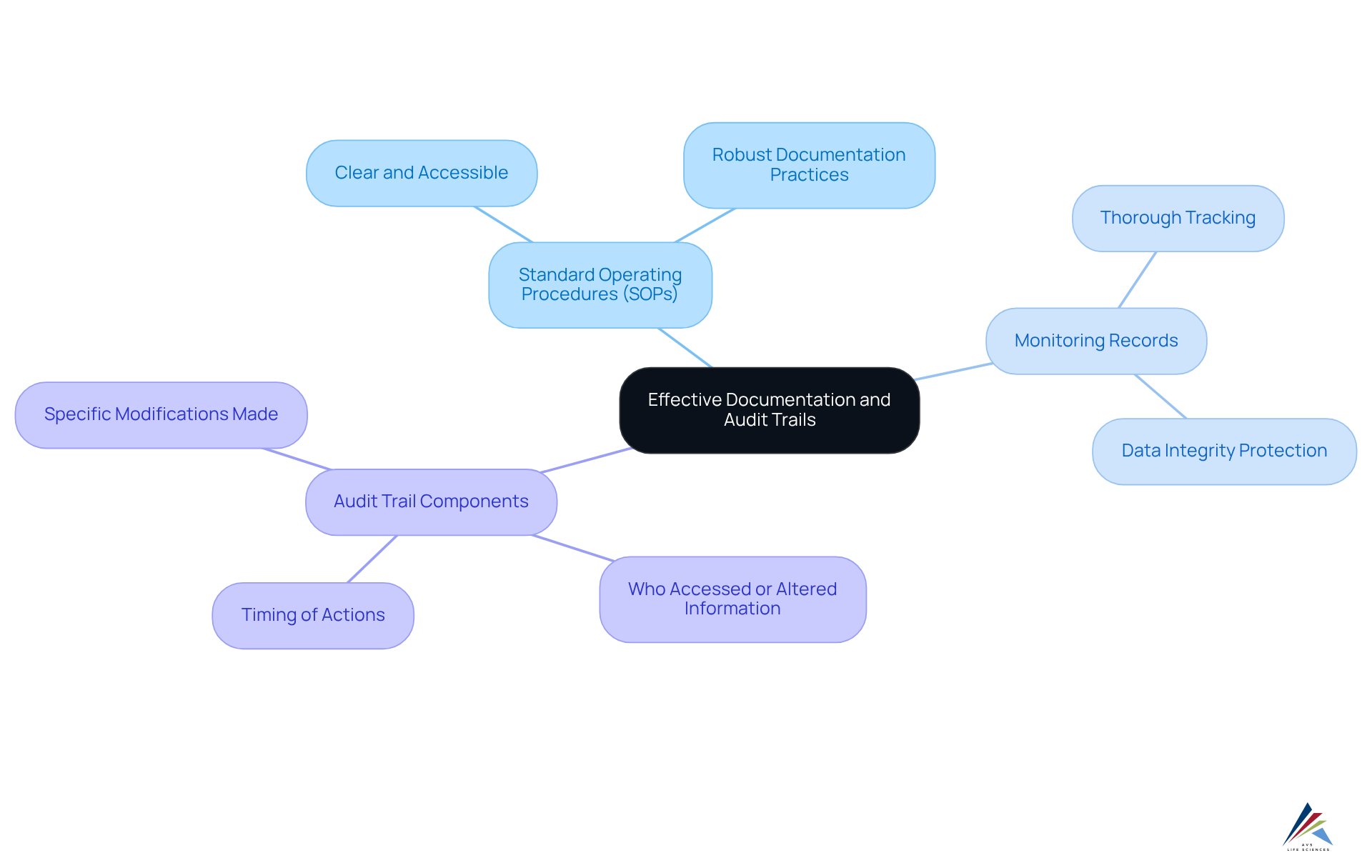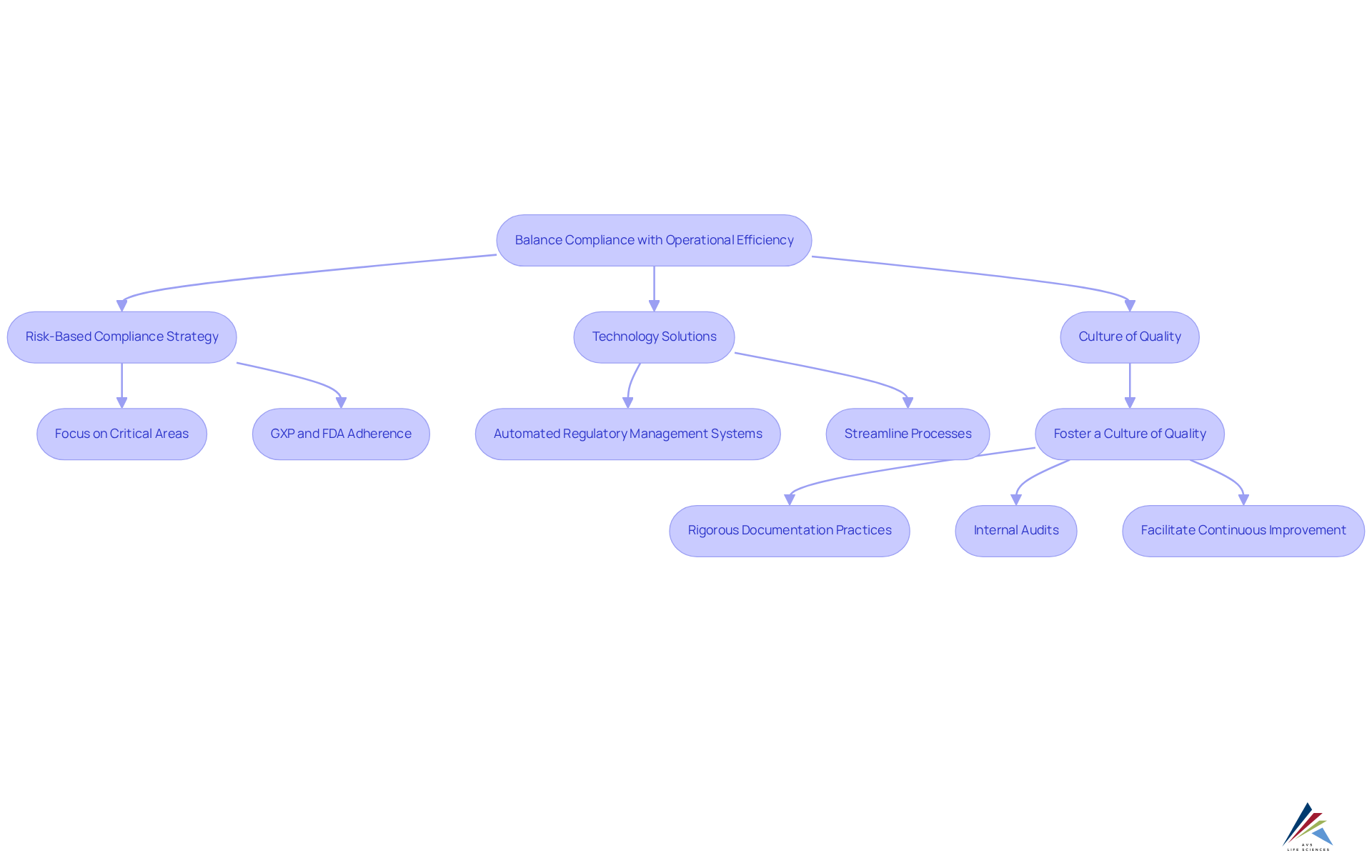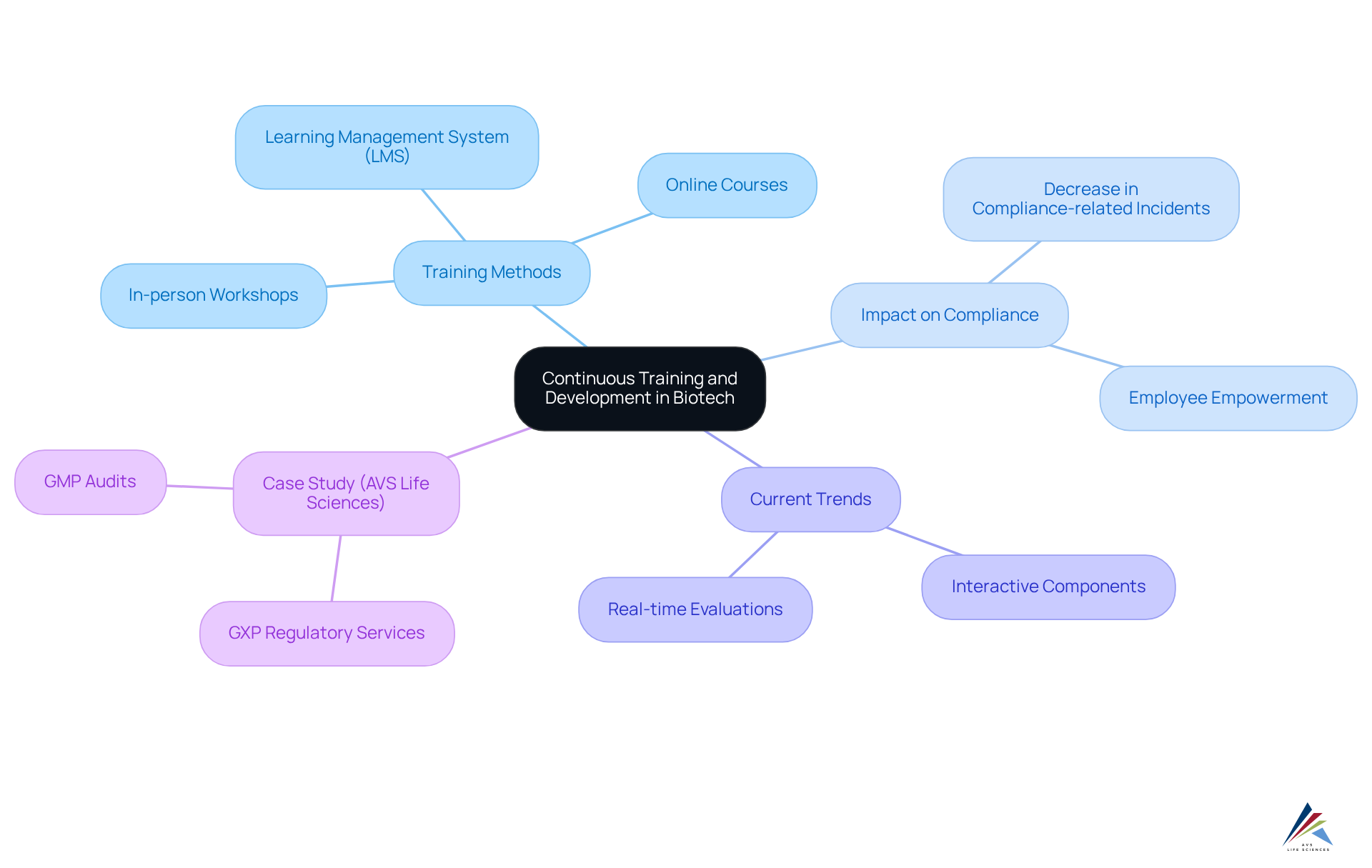Biotech Consulting: Key Strategies for Compliance Success

Overview
Biotech consulting strategies for compliance success begin with a clear understanding of regulatory frameworks, such as GMP and ISO. By implementing effective documentation practices and balancing compliance with operational efficiency, firms can navigate the complexities of the regulatory landscape.
- Continuous training is paramount; it not only reinforces compliance but also enhances operational capabilities.
- Thorough knowledge of regulations, coupled with robust documentation and training practices, empowers biotech firms to tackle compliance challenges effectively.
- Ultimately, these strategies not only ensure adherence to regulations but also drive operational excellence, positioning firms for long-term success in a competitive industry.
Introduction
Navigating the intricate landscape of biotechnology compliance presents significant challenges, especially as regulatory frameworks evolve and new standards emerge. Biotech companies have a unique opportunity to enhance their operational success through effective compliance strategies that not only meet regulatory requirements but also cultivate a culture of quality and excellence.
Yet, the challenge persists: how can organizations balance the demands of compliance with the necessity for operational efficiency while keeping pace with ongoing regulatory changes?
This article explores key strategies for achieving compliance success in the biotech sector, offering insights that can transform potential obstacles into avenues for growth and innovation.
Understand Regulatory Frameworks and Standards
Biotech companies face significant compliance challenges that necessitate a thorough understanding of various regulatory frameworks, including:
Each framework outlines specific requirements vital for ensuring product standards and safety. GMP emphasizes excellence management throughout the manufacturing process, while ISO standards provide comprehensive guidelines for maintaining consistent standards across products and services. Notably, in 2025, changes to ISO standards are anticipated to further refine these guidelines, underscoring the need for biotech firms to adapt swiftly.
To navigate these complexities, companies should proactively engage in to review updates from regulatory bodies such as the FDA and EMA, remaining informed about changes that could impact their operations. Engaging with industry specialists and participating in relevant training sessions offered by can significantly enhance and foster a within organizations.
As Gary E. Ritchie, a consultant, observes, 'To follow cGMP includes creating strong quality management systems and using good quality raw materials.' This statement highlights the necessity of integrating robust systems to effectively meet regulatory expectations.

Implement Effective Documentation and Audit Trails
To ensure compliance, must advise to adopt that encompass , procedures, and modifications. Central to this is the creation of that are not only clear but also easily accessible to all employees. Additionally, creating thorough monitoring records is essential for tracking changes and protecting data integrity. These review trails should meticulously record:
- Who accessed or altered information
- The timing of these actions
- The specific modifications made
This practice not only strengthens adherence in biotech consulting but also aids in the early detection of potential issues.
Frequent evaluations of records and inspection trails enable organizations to identify deficiencies and improve their . For instance, a biotech company that recently underwent an FDA inspection credited its success—resulting in zero findings—to its . This case illustrates how effective SOPs and audit trails can greatly enhance an organization's strategy for adhering to regulations, emphasizing the significance of these components in biotech consulting.

Balance Compliance Requirements with Operational Efficiency
Biotech firms frequently face the challenge of balancing stringent regulatory demands with the necessity for . To navigate this complexity, organizations should adopt a , concentrating on the most critical areas affecting product quality and safety, particularly and FDA regulations. Implementing technology solutions, such as , can streamline processes and mitigate manual errors.
For example, AVS Life Sciences assisted a leading biotechnology firm in upgrading their manufacturing area from a Biosafety Level 1 to a Level 2 GMP facility for lentivirus production. This enhancement ensured and bolstered operational efficiency, allowing the client to focus on medicine development.
By embedding adherence into daily operations and fostering a culture of quality, companies can . Key steps in this process encompass:
- Facilitate continuous improvement

Prioritize Continuous Training and Development
In the biotech sector, upholding regulations demands a steadfast dedication to continuous training and development for employees. Regular training sessions focused on , best practices for adherence, and are essential. Implementing a Learning Management System (LMS) significantly enhances this process by tracking and ensuring that all employees complete required courses.
For instance, a leading biotech firm developed a robust training program that combined in-person workshops with online courses, resulting in a marked decrease in . By fostering an environment of , organizations empower their employees to take responsibility for regulations, ultimately contributing to the company's overall success.
Current trends indicate that successful training programs are increasingly integrating interactive components and real-time evaluations, which further improve employee involvement and retention of critical regulatory knowledge.
AVS Life Sciences offers comprehensive , including GMP audits for APIs, drug products, and testing facilities, ensuring that organizations meet the highest standards of quality and compliance.

Conclusion
Navigating the complex landscape of biotech compliance is not just crucial; it is essential for organizations aiming to uphold high standards while adhering to regulatory requirements. Understanding regulatory frameworks, implementing effective documentation practices, balancing compliance with operational efficiency, and prioritizing continuous training and development are paramount. Each of these strategies is vital in fostering a culture of compliance that not only meets but exceeds industry standards.
Key insights underscore the necessity of engaging with biotech consulting to remain informed about regulatory changes. The significance of robust documentation and audit trails for data integrity cannot be overstated, nor can the potential of technology solutions to streamline compliance processes. Furthermore, ongoing training ensures that employees are knowledgeable and accountable, ultimately contributing to the overall success of biotech firms in a competitive market.
As the biotech industry evolves, organizations must embrace these compliance strategies as integral components of their operations. By doing so, they can transform compliance from a mere obligation into a driving force for innovation and excellence. The commitment to regulatory adherence safeguards product quality and safety while enhancing operational efficiency, paving the way for sustainable growth and success in the dynamic world of biotechnology.
Frequently Asked Questions
What regulatory frameworks must biotech companies understand?
Biotech companies must understand Good Manufacturing Practices (GMP), International Organization for Standardization (ISO) standards, and Quality System Regulations (QSR).
What is the purpose of Good Manufacturing Practices (GMP)?
GMP emphasizes excellence management throughout the manufacturing process to ensure product standards and safety.
How do ISO standards benefit biotech companies?
ISO standards provide comprehensive guidelines for maintaining consistent standards across products and services.
What changes to ISO standards are expected in 2025?
Changes to ISO standards in 2025 are anticipated to further refine the existing guidelines, requiring biotech firms to adapt swiftly.
How can biotech companies stay informed about regulatory updates?
Companies should engage in biotech consulting to review updates from regulatory bodies like the FDA and EMA, and participate in relevant training sessions.
What role do industry specialists play in regulatory compliance?
Engaging with industry specialists can significantly enhance regulatory capabilities and foster a culture of excellence within organizations.
What is the significance of creating strong quality management systems in biotech?
Creating strong quality management systems and using good quality raw materials are essential to effectively meet regulatory expectations, as highlighted by consultant Gary E. Ritchie.
